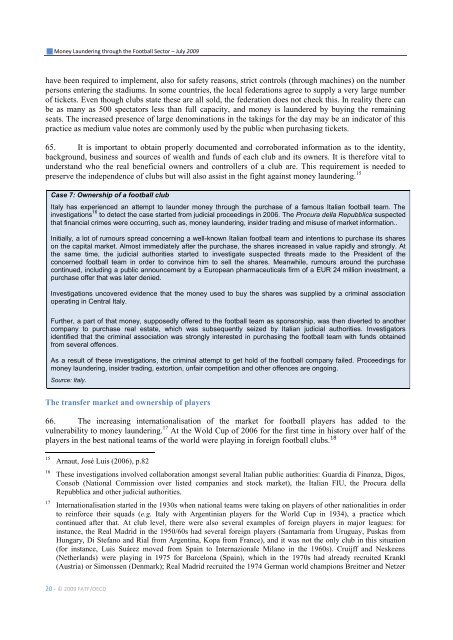Money Laundering through the Football Sector
Money Laundering through the Football Sector
Money Laundering through the Football Sector
You also want an ePaper? Increase the reach of your titles
YUMPU automatically turns print PDFs into web optimized ePapers that Google loves.
<strong>Money</strong> <strong>Laundering</strong> <strong>through</strong> <strong>the</strong> <strong>Football</strong> <strong>Sector</strong> – July 2009<br />
have been required to implement, also for safety reasons, strict controls (<strong>through</strong> machines) on <strong>the</strong> number<br />
persons entering <strong>the</strong> stadiums. In some countries, <strong>the</strong> local federations agree to supply a very large number<br />
of tickets. Even though clubs state <strong>the</strong>se are all sold, <strong>the</strong> federation does not check this. In reality <strong>the</strong>re can<br />
be as many as 500 spectators less than full capacity, and money is laundered by buying <strong>the</strong> remaining<br />
seats. The increased presence of large denominations in <strong>the</strong> takings for <strong>the</strong> day may be an indicator of this<br />
practice as medium value notes are commonly used by <strong>the</strong> public when purchasing tickets.<br />
65. It is important to obtain properly documented and corroborated information as to <strong>the</strong> identity,<br />
background, business and sources of wealth and funds of each club and its owners. It is <strong>the</strong>refore vital to<br />
understand who <strong>the</strong> real beneficial owners and controllers of a club are. This requirement is needed to<br />
preserve <strong>the</strong> independence of clubs but will also assist in <strong>the</strong> fight against money laundering. 15<br />
Case 7: Ownership of a football club<br />
Italy has experienced an attempt to launder money <strong>through</strong> <strong>the</strong> purchase of a famous Italian football team. The<br />
investigations 16 to detect <strong>the</strong> case started from judicial proceedings in 2006. The Procura della Repubblica suspected<br />
that financial crimes were occurring, such as, money laundering, insider trading and misuse of market information..<br />
Initially, a lot of rumours spread concerning a well-known Italian football team and intentions to purchase its shares<br />
on <strong>the</strong> capital market. Almost immediately after <strong>the</strong> purchase, <strong>the</strong> shares increased in value rapidly and strongly. At<br />
<strong>the</strong> same time, <strong>the</strong> judicial authorities started to investigate suspected threats made to <strong>the</strong> President of <strong>the</strong><br />
concerned football team in order to convince him to sell <strong>the</strong> shares. Meanwhile, rumours around <strong>the</strong> purchase<br />
continued, including a public announcement by a European pharmaceuticals firm of a EUR 24 million investment, a<br />
purchase offer that was later denied.<br />
Investigations uncovered evidence that <strong>the</strong> money used to buy <strong>the</strong> shares was supplied by a criminal association<br />
operating in Central Italy.<br />
Fur<strong>the</strong>r, a part of that money, supposedly offered to <strong>the</strong> football team as sponsorship, was <strong>the</strong>n diverted to ano<strong>the</strong>r<br />
company to purchase real estate, which was subsequently seized by Italian judicial authorities. Investigators<br />
identified that <strong>the</strong> criminal association was strongly interested in purchasing <strong>the</strong> football team with funds obtained<br />
from several offences.<br />
As a result of <strong>the</strong>se investigations, <strong>the</strong> criminal attempt to get hold of <strong>the</strong> football company failed. Proceedings for<br />
money laundering, insider trading, extortion, unfair competition and o<strong>the</strong>r offences are ongoing.<br />
Source: Italy.<br />
The transfer market and ownership of players<br />
66. The increasing internationalisation of <strong>the</strong> market for football players has added to <strong>the</strong><br />
vulnerability to money laundering. 17 At <strong>the</strong> Wold Cup of 2006 for <strong>the</strong> first time in history over half of <strong>the</strong><br />
players in <strong>the</strong> best national teams of <strong>the</strong> world were playing in foreign football clubs. 18<br />
15 Arnaut, José Luis (2006), p.82<br />
16 These investigations involved collaboration amongst several Italian public authorities: Guardia di Finanza, Digos,<br />
Consob (National Commission over listed companies and stock market), <strong>the</strong> Italian FIU, <strong>the</strong> Procura della<br />
Repubblica and o<strong>the</strong>r judicial authorities.<br />
17 Internationalisation started in <strong>the</strong> 1930s when national teams were taking on players of o<strong>the</strong>r nationalities in order<br />
to reinforce <strong>the</strong>ir squads (e.g. Italy with Argentinian players for <strong>the</strong> World Cup in 1934), a practice which<br />
continued after that. At club level, <strong>the</strong>re were also several examples of foreign players in major leagues: for<br />
instance, <strong>the</strong> Real Madrid in <strong>the</strong> 1950/60s had several foreign players (Santamaría from Uruguay, Puskas from<br />
Hungary, Di Stefano and Rial from Argentina, Kopa from France), and it was not <strong>the</strong> only club in this situation<br />
(for instance, Luis Suárez moved from Spain to Internazionale Milano in <strong>the</strong> 1960s). Cruijff and Neskeens<br />
(Ne<strong>the</strong>rlands) were playing in 1975 for Barcelona (Spain), which in <strong>the</strong> 1970s had already recruited Krankl<br />
(Austria) or Simonssen (Denmark); Real Madrid recruited <strong>the</strong> 1974 German world champions Breitner and Netzer<br />
20 - © 2009 FATF/OECD


